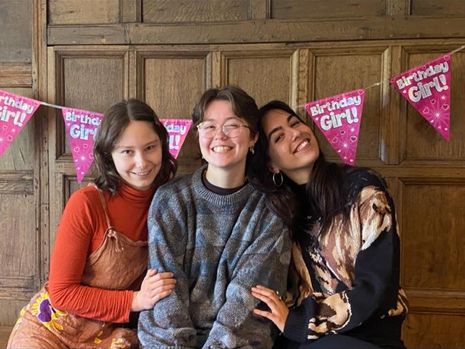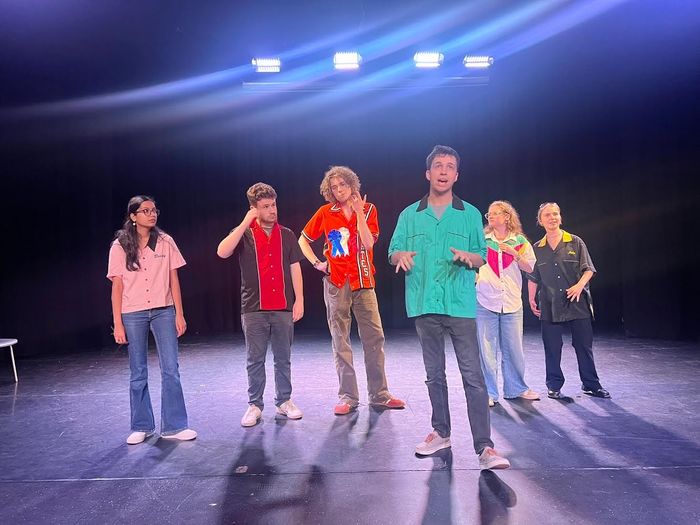It’s OK, I Still Think You’re Great will break your heart
This tightly-packed play tackles friendship, ageing, and the importance of forgiveness with wonderful aplomb

It’s OK, I Still Think You’re Great is a play about friendship, its beauty and bitterness, and the ways in which those closest to us can feel like instruments of torture at times. Raffaella Sero packs three friends into one room, and over the course of just under an hour, they discuss Shakespeare, fall out, fall apart, and put each other back together again. All the characters cry at some point - and Sero’s work is so moving that if you aren’t careful, you might find yourself tearing up too.
The central character is Tibby (Flossie Adrian) and the play takes place in the hours preceding her 25th birthday party. Her old friend and ex-flatmate Gin (Olivia Khattar) is visiting and meets Anika (Dominika Wiatrowska), the 30-year-old who replaced her in both roles. Anika and Gin don’t get on, and at first it seems that Gin is the villain – but there are no villains in this story, just flawed people hurting themselves and each other. Tibby is frustrated by her faltering acting career and love life, and feels jealous of Gin, who is caught between two cultures and feels that she has been shut out of Tibby’s life, while Anika is suffering under residual shame about her queerness and is stuck in an unfulfilling relationship. All three are getting older and having to face the reality that life just doesn’t always go the way you want it to.
“There are no villains in this story, just flawed people hurting themselves and each other”
All of these characters are in literary lines of work (theatre, writing, publishing) so it’s only fitting that a life-size cardboard cut-out of William Shakespeare oversees all of the action. He is quoted almost constantly, in lines that are chosen so judiciously that sometimes you almost miss that they are in fact Shakespeare. His cut-out is frequently picked up and sometimes it seems that the characters are trying to physically hide behind him, a symbol of the way that Shakespeare’s words are used in this play to avoid vulnerability and emotional honesty.
All three actors give strong performances, but the standout by far was Wiatrowska, whose portrayal of a more mature, but still troubled, woman is effortlessly natural and deeply compelling. It is Anika who is the centre of gravity for this story, around whom the two younger characters and their squabbles revolve. She is simultaneously the initial source of the tension between them and the eventual agent of their reconciliation. However, playing this role in the story means her own narrative arc is less developed. A lot is left unsaid about Gin as well – inner conflict stemming from her background is referred to, but not fully explored. And why is she so reluctant to discuss her literary career, since it is apparently successful? But such trade-offs are inevitable in a short play like this, and the main character, with whom the audience is chiefly intended to sympathise, is Tibby, who is fleshed out in all-too human detail.
“As the hour draws to a close, the play doesn’t so much end as dissolve”
At times the play’s messages about the passing of time and accepting failure lack subtlety. The scene where Tibby reads an email from her 22-year-old self, despite providing the line from which the title is drawn, is a little on the nose, as is the scene where she lies on the floor crying while ‘Back to the Old House’ by The Smiths plays. Sero should have more faith in the audience to understand what her play is about. Occasionally too the script seems to be trying a little too hard to mimic the rhythms of natural speech, which winds up having the opposite effect.
But for the most part, the themes are delicately handled, with all the minutiae of the dialogue and the acting working together to convey the deep relatability of the characters. The main takeaway for me, which was conveyed with overwhelming clarity and force, was the incredible importance of forgiveness: the need to forgive both ourselves and the people around us.
As the hour draws to a close, the play does not so much end as dissolve. At this point the party starts, and characters come on and off stage in their attempts to persuade the others (and the offstage guests) that everything is fine. Of course, this illusion collapses, but the play ends on a resoundingly life-affirming note. Served by excellent performances and an expertly worked script, It’s OK, I Still Think You’re Great will stay with me for a long time and is highly recommended viewing.
It’s OK, I Still Think You’re Great is showing at the theSpace @ Symposium Hall from 2nd-10th August at 11:00pm, and will then show at theSpace on the Mile from 12th-17th August at 10:55pm.
 News / Judge Business School advisor resigns over Epstein and Andrew links18 February 2026
News / Judge Business School advisor resigns over Epstein and Andrew links18 February 2026 News / Gov grants £36m to Cambridge supercomputer17 February 2026
News / Gov grants £36m to Cambridge supercomputer17 February 2026 News / Hundreds of Cambridge academics demand vote on fate of vet course20 February 2026
News / Hundreds of Cambridge academics demand vote on fate of vet course20 February 2026 News / CUCA members attend Reform rally in London20 February 2026
News / CUCA members attend Reform rally in London20 February 2026 News / Union speakers condemn ‘hateful’ Katie Hopkins speech14 February 2026
News / Union speakers condemn ‘hateful’ Katie Hopkins speech14 February 2026










